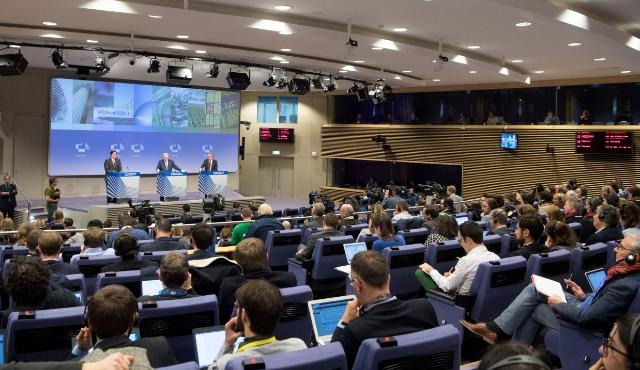In a full press room yesterday European Commission President Jean-Claude Juncker presented his ideas about how to make the European Union's work more efficient and how to improve the connection between the leaders of the EU institutions and the citizens of Europe. The proposals were presented yesterday (14 February) ahead of the Informal Leaders meeting of the 27 heads of state or government in Brussels on 23 February. Juncker stressed that some of the ideas lack support among all EU Member States and are not likely to be implemented during his remaining mandate period which ends in 2019.
“I have always said the form should follow function,” he said. “There are a number of steps we can take to make our work even more efficient in delivering on our key priorities. There are many options but the goal must be one and the same: creating a Europe that delivers."
As regards the so-called “"Spitzenkandidaten" system, where the lead candidates for the presidency of the European Commission are chosen by the political party groups in the European Parliament, he called on the parties to make their choice in good time before the elections in 2019 and before the end of this year.
The system was applied for the first time in the previous elections in 2014. Candidates should be proposed by both the Council and the Parliament to give “double legitimacy” to the person appointed to the post. Juncker proposes now also the idea of a “double-hatted” President for the Commission and Council.
A single person holding the two offices of President of the European Council and President of the European Commission could make the structure of the Union more efficient and is possible under the current Treaties, according to Juncker. But he did not think that it would happen already in 2019.
“(European Council President) Tusk and I have a good understanding between us but what would happen if the two presidents don’t agree and cannot work together?” he asked. “It would become a nightmare.”
Asked about the required qualities of the lead candidates, he preferred to hand over the question to the political parties but added that former prime ministers are usually suitable for the presidency posts.
Juncker is also in favor of so-called transnational lists in the elections to the European Parliament but admitted that it is not likely to happen in time to the elections in 2019 since it will require unanimous agreement of the Council and changes to electoral law in all 27 Member States.
In the meantime the Commission is recommending that the link between national parties and European parties be made more visible.
“They should also position themselves clearly on important European issues and express their intention for participating in political groups in the European Parliament and their choice for European Commission President.”
Juncker was proud of the on-going Citizens’ Dialogues on EU’s future with members of the Commission, the European Parliament, national governments, local and regional authorities and civil society representatives. “We should enhance the dialogue with citizens.”
Almost 500 of these interactive public debates have been held in 160 locations since 2012, and the Commission will increase their frequency between now and the European elections in May 2019, with a target of reaching around 500 more events.
He is worried about the right-wing Eurosceptic trend in some member states. Since 2010, Hungary has gradually become an “illiberal” democracy despite Commission protests. The centre-right European People’s Party group (EPP) in the European Parliament, to which Juncker belongs, did not offer much resistance according to an article in The New York Times.
What about Poland which is on the same track since the elections in 2015? “We keep our lines of communication open,” he replied. “I believe that our positions will come closer to each other.”
M.Apelblat
The Brussels Times

